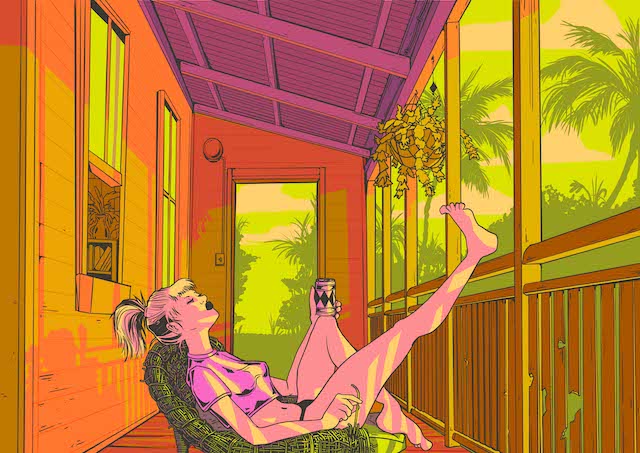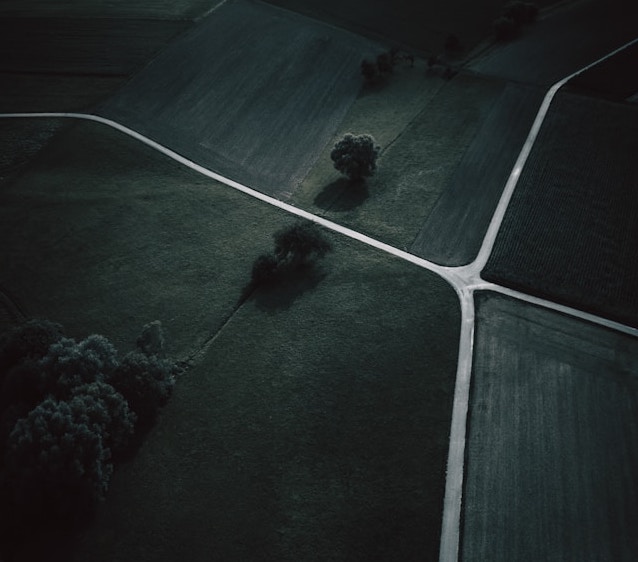Journal
Articles

Notes from a Sunshine City
I feel like our collective relationships with The House™ as a motif changed so much during that time; the housing crisis, lockdown and climate apocalypse were looming large all at once. Personally, I developed this kind of bizarre voyeuristic relationship with the suburbs and houses I passed on my mandated mental-health walks.

Safe as houses
Sometimes, if I can’t get to sleep, I imagine I’m back in the house where I grew up… I like to go back there in my mind’s eye, conjuring the slightly crooked hallway, the doors that never neatly fit their frames, the tiny kitchen with its overwhelmingly wheaten spectrum of 1980s browns.

No secret passageway
In 2001 I read an article in The Guardian newspaper about a man who fell from the sky, landing in a superstore car park not far from where I live in London. The article, by journalists Esther Addley and Rory McCarthy, detailed how the Metropolitan Police discovered the dead man’s identity through a combination of luck, Interpol and British-Pakistani community workers. Muhammad Ayaz had managed to slip through security at Bahrain airport, run across the tarmac and, according to witnesses on the plane, disappear beneath the wing of the British Airways Boeing 777. The article quotes a spokesman from the International Air Transport Association: a myth circulates that there is a ‘secret hatch from the wheel bay into the cargo bay, and then into the passenger cabin, as if it were a castle with a dungeon and a series of secret passageways’. No such passageway exists and Muhammad would have found himself trapped in the wheel bay with no oxygen, no heating and no air pressure as well as no way out. If he wasn’t crushed or burned by the retracting wheels, he may have frozen to death once the flight reached 30,000 feet, finally falling out hours later when the plane lowered its landing gear as it prepared to touch down at Heathrow.

Home is where the haunt is
Ghosts, like people, tend to be attached to a particular place. The term ‘to haunt’ in English has three linked meanings. First, for a ghost to manifest itself at a place regularly: a grey lady who haunts the chapel. Second, to be persistently and disturbingly present in someone’s mind: the sight haunted me for years. Third, to frequent a place often and repeatedly: that’s his old haunt. Home and haunting go hand in hand. Ghosts don’t haunt an entire city. They haunt a specific house, a dwelling, usually assumed to be the place where they died.

Interstitial
American sociologists John and Ruth Hill Useem first coined the term ‘third culture kid’ in the 1950s to describe the experience of Americans who were raised abroad in a culture different to their birth culture. This term reflects the way children raised overseas straddle three cultures: the culture of their birth, the culture within which they are raised, and a third, nebulous culture – the culture they create through the way they learn to relate to each other. The third culture is interstitial, not an amalgam. ‘Third culture kid’ (TCK) is a term often used as shorthand. Many TCKs will have experienced more than one cultural shift too. Those with diplomatic, military or missionary families are often raised in multiple countries, and others, like me, will continue their travels overseas as adults too, exercising the global and economic mobility they know well.

Home as a weapon of cultural destruction
It was simply expected that Aboriginal people would accept the values and behaviour of the dominant European culture. The Welfare Board insisted that Aboriginal people not only earn an independent living but show the Board they could save money in a bank account. They had to demonstrate that they were avoiding contact with other Aboriginal people and refusing to participate in community-oriented activities, such as sharing resources with kinsfolk and travelling to visit their relatives and home Country. Over and over again, the Board’s reports criticised Aboriginal people for being among their own kind and clinging together in groups. To achieve their assimilation aims, the Welfare Board implemented a crude ‘carrot and stick’ incentive in an attempt to modify Aboriginal behaviour: if Aboriginal people could convince the Welfare Officers that they had cut themselves off entirely from their culture, family and land, they would be rewarded with an ‘Exemption Certificate’.

Buy, recycle, repeat
The tip shop creates a vacuum of sentimentality. This only adds to the thrill of the hunt, where the search becomes bigger than the thing itself. In that moment, time alters. The past and present merge and we step outside, just for a second, the familiar cycles of desire and need that shape our daily lives. For a moment, something can be treasured, even if the object of our fantasy exists only in our minds. We look for it in the piles of things people leave behind, searching through the rubbish; all we’re really looking for is ourselves. Reflected back to us are the rain-washed artefacts of our consumption that are lined up and sorted on pallets and old tables. The metallic shells of old fireplace flues, stacks of doors and aluminium windows, fishing nets and old tyres that fill the outside lot.

Home is a long way away
The Australian housing market is a wealth-generating machine, not a home-generating machine. So much is wrong with the current situation. No doubt you see it too; everybody seems to on some level. That’s why we keep hearing about the ‘Australian housing crisis’. I can see it, and I proudly consider myself an old-school capitalist, with a preference for free enterprise, fair competition, private property rights and the chance to make an occasional profit. We now find ourselves with a de facto caste system in Australia: the home owners relative to the home renters. Both groups need homes, but there is a marked wealth division between those collecting passive income on houses they own and those living solely on direct income who are forever chasing a rising market.

Shelf life
Shelves provide functional storage. But as we learnt from the setting of all those Covid lockdown interviews – the expert in front of their books, photographs and tchotchkes – shelves express personality, achievement and erudition. As those same interviews demonstrated, sometimes our best curatorial efforts might miss something too revealing about what we really read and truly value. For the Victorians, who were obsessed with privacy and established many of the norms around middle-class dwelling that continue to influence aspects of contemporary domesticity, shelves posed a particular problem precisely because you could never be sure who was looking at them and what kind of conclusions they might reasonably draw.
The great British architect of middle-class respectability, Robert Kerr, designed homes where privacy was the paramount and exalted objective, achieved through a complex network of ever more enclosable spaces designed to protect property and personal information from the apparently insatiable curiosity of servants.

More than maternity
Principle among art-history instances of breastfeeding are paintings, sculptures, tapestries and stained-glass art in churches that relay key Biblical moments of the Virgin Mary nursing the baby Jesus. Should you find yourself in the corridors of the Louvre, in the same halls where kings and princes are eternalised, one singular image of breastfeeding will make its way towards you time and time again: that of the Virgin Mary nursing the baby Jesus, which emerged in the twelfth century and proliferated in full bloom from the fourteenth as her cult of worship grew. In art, the nursing Virgin is called the Madonna Lactans, and she is a sanctity. Most of all, as the Church’s model of maternity, she is silent. The son of God as a human baby on Earth has presented something of a conundrum for theology. God may be all powerful, but humans are sinful and females are – in today’s parlance – problematic.

Steering upriver
At dawn I cross the bridge, Missouri to Iowa, and turn down the gravel drive. Though I’m different now, this place is the same as it always is this time of year: the sun glowing red over the paddock next door, the grass not yet green, the maple stark. I go away, come back again, and home is like a photograph where time winds back, slows into stasis; where the carpet has changed, but the dishes have not, the cookbooks have not, the piano and artwork and bath towels have not. Here, I can be a child again, my best self, briefly. I hold on to this moment for as long as I can, because too soon I’ll remember how disobedient I am, how bossy and domineering, how I slammed my door until Dad took it off its hinges, how soap tastes in my mouth, how I pushed on these walls until they subsided.

Follow the road to the yellow house
I first visited Varuna in 1994. I had just left my job as the Aboriginal Curator at the Australian National Maritime Museum, where I was involved in establishing the first gallery dedicated to addressing Aboriginal and Torres Strait Islander maritime history. I remember that visit well – even then I felt at home. I grew up in the Blue Mountains. My parents bought our family home there in the early 1970s. It was built in the 1940s, which means that it has a similar interior to Varuna, with ornate cornices, creamy white bathroom tiles, a green basin and bath, Bakelite door handles and even an old black phone.